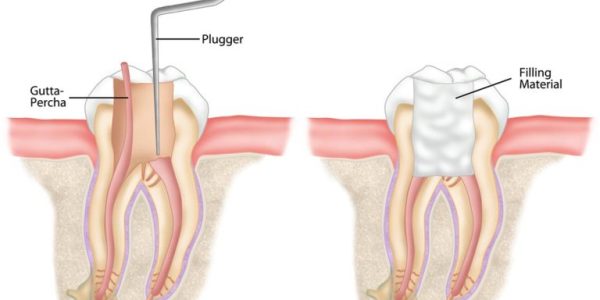Root Canal Treatment for Children, Many children suffer from tooth decay at an early age due to an unbalanced and unhealthy diet, consuming large amounts of sugars, starches, and sweets capable of causing tooth decay. It may be minor or extend to the tooth nerve. In the following paragraphs, we will learn about the root canal treatment procedure for children, its types, its main features, and the risks associated with it.

Root Canal Treatment for Children
It is important for a child to maintain and care for their permanent teeth. A tooth consists of an outer crown, a root, and an inner nerve. The nerve is made up of the upper nerve chamber and canals that extend from the tooth roots down to the main jaw nerves and blood vessels.
The tooth nerve area contains sensory nerves that allow the teeth to sense cold, heat, and pressure, as well as small blood vessels that nourish them. Root canal treatment involves a lot of information that we will discuss in detail in the following paragraphs.
“Do you want to see your children smiling without pain? Try our advanced root canal treatment services for children and let them enjoy excellent oral health.”
Root canal treatment for children is defined as the removal of the deep pulp inside the tooth due to infection or inflammation. It is essential to treat the tooth or molar because leaving it without treatment or extraction can have adverse consequences, and it may eventually fall out or become unsuitable for filling later on.
Applying root canal treatment to the tooth protects it from further deterioration and disease progression while helping to save it. Additionally, maintaining primary teeth for as long as possible helps guide the proper eruption of permanent teeth.
If decay reaches the tooth nerve, it must be removed immediately and replaced with a suitable filling. There are several types of fillings, depending on the material used, but for children, it is best to use materials that can fill gaps and resist further decay. Glass ionomer fillings contain fluoride, which has essential properties that make it the preferred choice for filling children’s teeth. Additionally, zinc-containing materials can be used to fill inflamed canals.
Other types of fillings include gold, composite, ceramic, and silver. If any of these fillings are used, a crown must be placed to ensure the tooth’s protection from damage or harm. After completing the filling, the dentist will take an impression for the crown and schedule another appointment to place it.
The primary purpose of root canal treatment is to preserve the tooth’s condition and prevent further deterioration. There are several reasons that may require a dentist to perform a root canal on a child’s affected tooth, including:
If you want to learn more about the role of decay in tooth damage and its consequences, we recommend reading the following article: Tooth Decay in Children.
“Let your children smile with confidence! Our specialized dental center offers the best root canal treatment services for children.”
Many mothers wonder whether their child’s teeth should be filled if the decay reaches the nerve or if it’s better to leave it untreated. The decision depends on whether the teeth are primary or permanent. In the case of primary teeth, no treatment is necessary since they will all fall out by the time the child is around six years old, when the jaw is fully developed and can accommodate permanent teeth.
Root canal treatment for children is not considered harmful, but it may result in some complications that can occur with any dental procedure. We will discuss these complications and risks in more detail in the following paragraphs.
Nerve removal can be performed for children, and the appropriate age varies from child to child, but the suitable time is usually around 10 years old. The age may differ depending on the tooth’s location in the mouth. There is indeed a root canal treatment for primary teeth in children, which is often the better option than extraction. However, the decision is based on the child’s age and determines the treatment approach the dentist will follow.
Root canal treatment for children may require one or two appointments. The dentist will request X-rays to assess the extent of damage to the tooth and evaluate the condition to determine the appropriate procedures.
The child will then be given local anesthesia to ensure they do not feel any pain during the treatment area. The dentist will isolate the tooth from the surrounding teeth using a vinyl or rubber barrier to protect the other teeth from contamination. Next, the dentist will use a small drill to access the tooth nerve and make an opening from the top to the inside to reach the nerve. The dentist will then remove the nerve from the roots, depending on the number of roots in the affected tooth.
The dentist will clean the tooth thoroughly to ensure no nerve remnants are left. If there are more roots, the treatment duration will be longer. The dentist will use an antibacterial solution to kill any remaining bacteria and reduce the risk of further infection. It is common for a child’s teeth to fall out naturally and not be filled with a filling.

How to Perform Root Canal Treatment for Children
Children undergoing root canal treatment have several benefits, including:
Despite the benefits mentioned above, root canal treatment for children has some risks and drawbacks that may discourage some from undergoing the procedure, including:
At our Dental Care Center, dentists prefer performing root canal treatment on children’s teeth instead of extraction, especially during their early years. Repeated extractions can have adverse effects on a child’s dental health, including:
There are some precautions that should be followed during and after root canal treatment for children, including:
Root canal treatment prices in Egypt range from 900 to 1,200 Egyptian pounds, depending on the dentist, dental clinic, and the type of filling material used. We recommend one of the best medical centers specializing in root canal treatment for children’s teeth, The Dental Center which offers the best services at the most affordable prices. You can contact the center officially by clicking on the following link:The Dental Center“.
Treatment of tooth decay in children at two years old, As soon as children’s teeth appear, some problems begin to appear, including tooth decay, which is
Treating Tooth Decay in 2-Year-Old Children, Tooth decay in children is considered one of the common problems, which causes a lot of pain and discomfort for
Children’s Dental Treatment, Most parents care about their children’s teeth from birth, but this does not prevent children’s teeth from